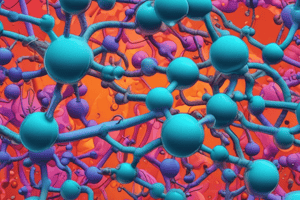Podcast
Questions and Answers
What occurs according to Henry's Law when the partial pressure of a gas is higher in a liquid than in its adjacent gas phase?
What occurs according to Henry's Law when the partial pressure of a gas is higher in a liquid than in its adjacent gas phase?
- The gas will react with the liquid.
- Gas molecules will reenter the gaseous phase. (correct)
- The gas will remain dissolved indefinitely.
- The gas will dissolve more effectively in the liquid.
Which gas has the highest solubility in water, according to the principles of Henry's Law?
Which gas has the highest solubility in water, according to the principles of Henry's Law?
- Nitrogen (N2)
- Methane (CH4)
- Oxygen (O2)
- Carbon Dioxide (CO2) (correct)
How does an increase in temperature affect the solubility of gases in liquids according to Henry's Law?
How does an increase in temperature affect the solubility of gases in liquids according to Henry's Law?
- It increases the solubility of all gases.
- It selectively decreases the solubility of less soluble gases.
- It decreases the solubility of all gases. (correct)
- It has no effect on solubility.
Which statement is true regarding the movement of CO2 in the lungs, based on the principles of gas exchange?
Which statement is true regarding the movement of CO2 in the lungs, based on the principles of gas exchange?
According to Dalton’s Law of Partial Pressures, which of the following accurately describes the behavior of gases in a mixture?
According to Dalton’s Law of Partial Pressures, which of the following accurately describes the behavior of gases in a mixture?
What effect does an increase in altitude have on atmospheric gas pressure?
What effect does an increase in altitude have on atmospheric gas pressure?
How does Henry's law relate to the solubility of gases in liquids?
How does Henry's law relate to the solubility of gases in liquids?
Which of the following best describes Dalton's law of partial pressures?
Which of the following best describes Dalton's law of partial pressures?
Which condition is NOT a factor affecting the solubility of gases in liquids?
Which condition is NOT a factor affecting the solubility of gases in liquids?
What is the primary reason gases diffuse into liquids?
What is the primary reason gases diffuse into liquids?
Flashcards are hidden until you start studying
Study Notes
Boyle's Law
- Describes the relationship between the pressure and volume of a gas
- At a constant temperature, pressure of a gas varies inversely with its volume
- Gases always fill their container, therefore in a large container, the molecules of a gas will be far apart and the pressure will be low
- If the volume of the container is reduced, the gas molecules will be forced closer together and the pressure will rise
Dalton’s Law of Partial Pressures
- States that the total pressure exerted by a mixture of gases is the sum of the pressures exerted independently by each gas in the mixture
- Each gas in a mixture exerts a pressure called its partial pressure, which is proportional to the percentage of that gas in the gas mixture
- Nitrogen (N2) makes up 79% of air and has a partial pressure of 597 mm Hg
- Oxygen (O2) makes up 21% of air and has a partial pressure of 159 mm Hg
- At high altitudes, partial pressures decline in direct proportion to the decrease in atmospheric pressure
Henry's Law
- States that when a gas is in contact with a liquid, the gas will dissolve in the liquid in proportion to its partial pressure
- The greater the concentration of a particular gas in the gas phase, the more and the faster that gas will go into solution in the liquid
- This principle is applied in gas exchange in the lungs and tissues
- The direction and amount of gas movement is determined by its partial pressure in the two phases
- The solubility of the gas and the temperature of the liquid also influence the amount of gas that will dissolve in a liquid
- CO2 is most soluble in liquids
- O2 is 1/20 as soluble as CO2
- N2 is only half as soluble as O2
- When a liquid's temperature rises, gas solubility decreases
- Example: Soda drinks, the CO2 gas will slowly go flat if left in the fridge, but very quickly go flat if left at room temperature.
Factors affecting gas solubility in liquids
- Partial pressure of the gas in contact with the liquid
- Solubility of the gas in the liquid
- Temperature of the liquid
Studying That Suits You
Use AI to generate personalized quizzes and flashcards to suit your learning preferences.




